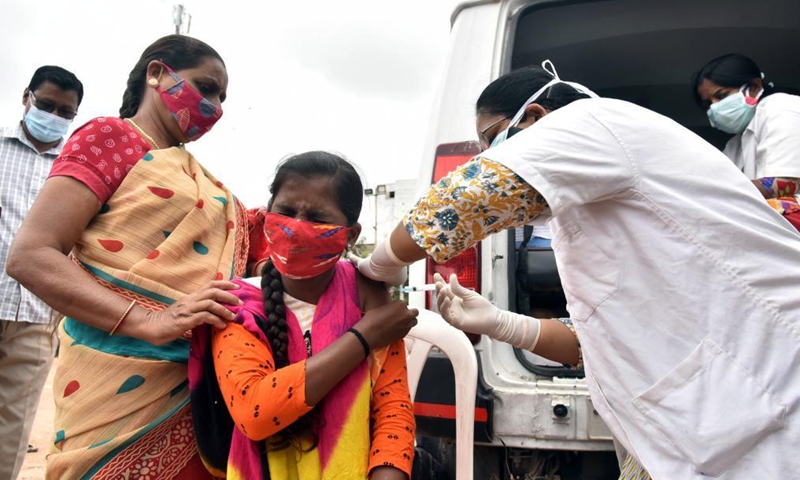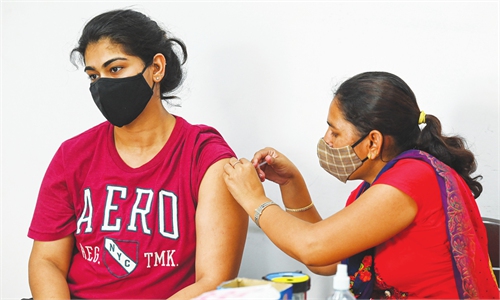
A health worker administers a dose of COVID-19 vaccine to a woman in Hyderabad, India, on June 24, 2021.Photo:Xinhua
After the second wave of COVID-19 epidemic disrupted the already battered economic growth progress in India, various agencies recently released updated growth forecasts for the Indian economy.
Economic think-tank National Council of Applied Economic Research (NCAER) on Friday estimated India's GDP to grow 11.5 percent in the first quarter and 8.4 to 10.1 percent for the current financial year 2021-22. The better-than-expected growth projections came at a time when the Indian economy took a hit from the second wave of the COVID-19 outbreak and struggled to recover amid the Indian government's vaccination effort.
By comparison, two international rating agencies slashed their growth forecasts for the Indian economy. Moody's Investors Service lowered India's growth estimate to 9.6 percent for the 2021-22 fiscal year, from its earlier forecast of 13.9 percent, noting that faster vaccination progress will be crucial for the South Asian nation in curbing COVID-19 impacts. Meanwhile, S&P Global Ratings also reduced its growth forecast from 11 percent earlier to the 9.5 percent for the current fiscal year.
While these forecasts all factored in the impact of the second wave on the Indian economy, there is growing recognition that numbers may not be enough to offer a clear picture about India's economic problems.
For instance, the Indian government on Wednesday said the total foreign direct investment (FDI) inflows into the country in April jumped 38 percent year-on-year to $6.24 billion. Robust FDI growth is often seen as a sign of foreign investment's strong confidence in the Indian economy, but there are already concerns in the market that most of the FDI actually went to the financial markets instead of benefiting the real economy.
This is because India's stock markets recorded especially bullish performance over the past months despite the fact that the impact of the second wave has largely frozen the economic activities across the country for weeks. The benchmark BSE Sensex achieved a milestone by hitting an all time high of 53,057.11 last week, nearly doubling from a low in March 2020.
Moreover, while India's manufacturing sector has been losing orders due to the second wave, it seems unrealistic to expect large inflows of foreign capital. In this sense, the conflict between financial markets and the real economy may lead to new problems, such as financial turmoil and a further widening of the gap between rich and the poor.
To a certain extent, the impact of the outbreak on the Indian economy may not be reflected in the economic figures directly, but will probably generate more troubles for the long-term development. In any case, India needs to contain its outbreak as soon as possible to defer a third wave or its economic stability will have to face more illnesses.



